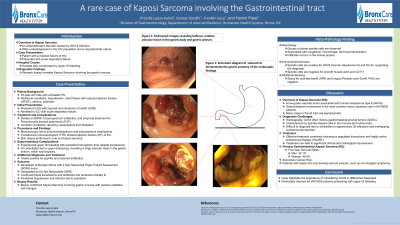Monday Poster Session
Category: Stomach
P3389 - A Rare Case of Kaposi Sarcoma Involving GI Tract
Monday, October 28, 2024
10:30 AM - 4:00 PM ET
Location: Exhibit Hall E

Has Audio
- PL
Priscilla Lajara Hallal, MD
BronxCare Health System
Bronx, NY
Presenting Author(s)
Priscilla Lajara Hallal, MD, Franklin Sosa, MD, Sameer Kandhi, MD, Harish Patel, MD
BronxCare Health System, Bronx, NY
Introduction: Kaposi Sarcoma is an angioproliferative disorder caused by HHV-8 infection. It is usually underdiagnosed in HIV population given that is usually asymptomatic. We present a patient with medical history of HIV that presented with acute respiratory failure with hospital stay complicated by upper GI bleeding. Stomach biopsy showed Kaposi Sarcoma involving Gastric mucosa.
Case Description/Methods: 32-year-old male with untreated HIV, hypertension, Heart failure with reduced ejection fraction, asthma, and psoriasis, presented to the ED with hypoxia and SOB. Patient was admitted to the ICU with acute respiratory failure. He was started on BiPAP, broad-spectrum antibiotics, and empirical treatment for PJP. Status worsened with patient needing pressors and eventually patient was intubated. He underwent a bronchoscopy and developed pneumomediastinum and subcutaneous emphysema. A TTE revealed an EF of 9%. A skin biopsy was performed to rule out Kaposi sarcoma. Patient was noted to have upper GI bleeding with persistent drop of HGB despite multiple blood transfusions. GI saw patient for upper GI bleeding and upper endoscopy revealed a large vascular mass in the gastric antrum which was biopsied. He tested positive for syphilis and continued on antibiotics. Despite treatment, he developed multiorgan failure with a high SOFA score and was made DNR. He continued to receive blood transfusions and antibiotics, but remained critically ill with persistent hypotension and infection, and eventually expired. Biopsy results showed Kaposi Sarcoma involving gastric mucosa with reactive epithelial cell changes.
Discussion: Kaposi sarcoma (KS) is a low-grade vascular tumor associated with human herpesvirus type 8 (HHV8). Though rare, gastrointestinal involvement is the most common extra-cutaneous site of KS in HIV/AIDS patients, with many cases being asymptomatic. Histologically, gastrointestinal KS often mimics gastrointestinal stromal tumors (GISTs) due to the presence of spindle-shaped cells primarily located in the mucosa and submucosa. Diagnosing GI-KS can be difficult due to its similarity to opportunistic GI infections, particularly when symptoms like diarrhea are present. Effective treatment involves a combination of intravenous pegylated doxorubicin and highly active antiretroviral therapy (HAART), which can lead to significant clinical and radiological improvement. This case highlights the importance of considering GI-KS in differential diagnoses for HIV/AIDS patients with upper GI bleed.
Disclosures:
Priscilla Lajara Hallal, MD, Franklin Sosa, MD, Sameer Kandhi, MD, Harish Patel, MD. P3389 - A Rare Case of Kaposi Sarcoma Involving GI Tract, ACG 2024 Annual Scientific Meeting Abstracts. Philadelphia, PA: American College of Gastroenterology.
BronxCare Health System, Bronx, NY
Introduction: Kaposi Sarcoma is an angioproliferative disorder caused by HHV-8 infection. It is usually underdiagnosed in HIV population given that is usually asymptomatic. We present a patient with medical history of HIV that presented with acute respiratory failure with hospital stay complicated by upper GI bleeding. Stomach biopsy showed Kaposi Sarcoma involving Gastric mucosa.
Case Description/Methods: 32-year-old male with untreated HIV, hypertension, Heart failure with reduced ejection fraction, asthma, and psoriasis, presented to the ED with hypoxia and SOB. Patient was admitted to the ICU with acute respiratory failure. He was started on BiPAP, broad-spectrum antibiotics, and empirical treatment for PJP. Status worsened with patient needing pressors and eventually patient was intubated. He underwent a bronchoscopy and developed pneumomediastinum and subcutaneous emphysema. A TTE revealed an EF of 9%. A skin biopsy was performed to rule out Kaposi sarcoma. Patient was noted to have upper GI bleeding with persistent drop of HGB despite multiple blood transfusions. GI saw patient for upper GI bleeding and upper endoscopy revealed a large vascular mass in the gastric antrum which was biopsied. He tested positive for syphilis and continued on antibiotics. Despite treatment, he developed multiorgan failure with a high SOFA score and was made DNR. He continued to receive blood transfusions and antibiotics, but remained critically ill with persistent hypotension and infection, and eventually expired. Biopsy results showed Kaposi Sarcoma involving gastric mucosa with reactive epithelial cell changes.
Discussion: Kaposi sarcoma (KS) is a low-grade vascular tumor associated with human herpesvirus type 8 (HHV8). Though rare, gastrointestinal involvement is the most common extra-cutaneous site of KS in HIV/AIDS patients, with many cases being asymptomatic. Histologically, gastrointestinal KS often mimics gastrointestinal stromal tumors (GISTs) due to the presence of spindle-shaped cells primarily located in the mucosa and submucosa. Diagnosing GI-KS can be difficult due to its similarity to opportunistic GI infections, particularly when symptoms like diarrhea are present. Effective treatment involves a combination of intravenous pegylated doxorubicin and highly active antiretroviral therapy (HAART), which can lead to significant clinical and radiological improvement. This case highlights the importance of considering GI-KS in differential diagnoses for HIV/AIDS patients with upper GI bleed.
Disclosures:
Priscilla Lajara Hallal indicated no relevant financial relationships.
Franklin Sosa indicated no relevant financial relationships.
Sameer Kandhi indicated no relevant financial relationships.
Harish Patel indicated no relevant financial relationships.
Priscilla Lajara Hallal, MD, Franklin Sosa, MD, Sameer Kandhi, MD, Harish Patel, MD. P3389 - A Rare Case of Kaposi Sarcoma Involving GI Tract, ACG 2024 Annual Scientific Meeting Abstracts. Philadelphia, PA: American College of Gastroenterology.
